To promote excellence in scholarship and teaching, the Graduate School maintains a book publication program providing resources on topics relevant to graduate education and the university classroom. The following volumes are currently available in print and/or PDF format.
***NEW FROM THE GRADUATE SCHOOL PRESS! ***
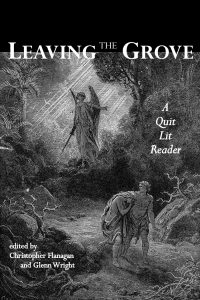
ISBN 978-0-97778-479-0
6 x 9, 302 pages, 3 black-and-white illustrations, notes, bibliography, index
Leaving the Grove: A Quit Lit Reader
Edited by Christopher Flanagan and Glenn Wright
Leaving the Grove is the first major publication devoted to the phenomenon of “quit lit” — farewells to academia by those at all levels (graduate student through tenured professor) who have elected to resign their posts or stop looking for one. Part 1 anthologizes classics of the genre, while Part 2 comprises secondary essays exploring quit lit from various critical and historical perspectives. The volume as a whole uses quit lit as a lens through which to examine the academic labor system, precarity, graduate education, and the future of the professoriate.
“I hope you’re inspired by the honesty here, and the intimacy of bringing an audience along as each author jumped out of the ivory tower and hoped they’d land softly.”
-from the Foreword by Rebecca Schuman
Look Inside | Order Leaving the Grove
Also from The Graduate School Press
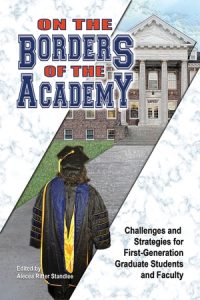
ISBN 978-0-9777847-8-3
6 x 9, 327 pages, 1 table, notes, bibliography, index
On the Borders of the Academy: Challenges and Strategies for First-Generation Graduate Students and Faculty
Edited by Alecea Ritter Standlee
One of the most significant achievements in U.S. higher education during the latter half of the 20th century was the increasing access enjoyed by historically marginalized populations, including women, people of color, and the poor and working class. With this achievement has come a growing population of first-generation graduate students and faculty members, who struggle at times to navigate unfamiliar territory. Today, these individuals and institutions are faced with profound challenges in adapting to shifts within a social environment increasingly hostile to education. The growing diversity in higher education has left it open to attacks by those who wish to maintain systems of privilege and inequality. This book offers insight on the challenges of first-generation academics, as well as practical tools for navigating the halls of the academy for individuals and institutional allies alike.
Look Inside | Order On the Borders of the Academy
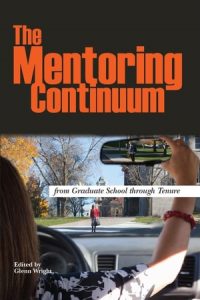
ISBN 978-0-9777847-6-9
6 x 9, 306 pages, 4 black-and-white illustrations, 3 tables, notes, bibliography, index
The Mentoring Continuum: From Graduate School Through Tenure
Edited by Glenn Wright
Recent developments in academic mentoring have challenged longstanding conceptions of the mentor-mentee relationship as a top-down, wisdom-bestowing proposition. There is growing awareness that for the majority of their working lives, academics are both mentors and mentees, and have shifting needs and obligations as their careers progress. That is, they occupy a mentoring continuum whose navigation requires effort, reflection, and good faith. This book offers theoretical and practical tools to help them on their way, and indicates how institutional resources can be mobilized in support.
Look Inside | Order The Mentoring Continuum
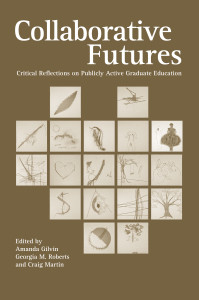
ISBN 978-0-9777847-5-2
6 x 9, 442 pages, 10 illustrations, 2 tables, notes, bibliography, index
Collaborative Futures: Critical Reflections on Publicly Active Graduate Education
Edited by Amanda Gilvin, Georgia M. Roberts, and Craig Martin
Collaborative Futures places graduate education at the center of ongoing efforts to legitimize publicly engaged scholarship within the academic profession. It is indispensable reading not only for graduate students seeking inspiration, resources, and usable frameworks for their engaged scholarship, but for the faculty who are called upon to mentor them, and for university administrators seeking encouraging answers to questions about the future of graduate education.
Look Inside | Order Collaborative Futures
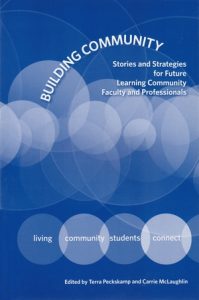
ISBN 978-0-9777847-3-8
6 x 9, 133 pages, notes, bibliography, index
Building Community: Stories and Strategies for Future Learning Community Faculty and Professionals
Edited by Terra Peckskamp and Carrie McLaughlin
Successful learning communities can reinvent undergraduate education for the better. This volume explores the challenges, opportunities, and strategies involved in creating learning communities that positively impact students’ intellectual and personal growth. Part I examines the history of the learning community movement, different models for structuring learning communities, and strategies for assessing the effectiveness of programs. Part II shows learning communities in operation from a variety of perspectives.
Look Inside | Order Building Community
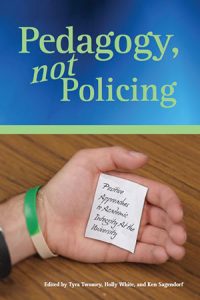
ISBN 978-0-9777847-4-5
6 x 9, 176 pages, 5 tables, notes, bibliography
Pedagogy, not Policing: Positive Approaches to Academic Integrity at the University
Edited by Tyra Twomey, Ken Sagendorf, and Holly White
Pedagogy, not Policing is born out of a shared belief in the twin values of quality teaching and community effort.
Bringing together the voices of graduate and undergraduate students, TAs, faculty, and other members of university communities, it asks and addresses such questions as what Academic Integrity (AI) is, what roles it plays in our colleges and universities, whom it serves, and what practices nourish and/or jeopardize it.
The contributors will both challenge what you think you know about AI and offer pragmatic, concrete tools for how to promote it in classrooms.
2009 AESA Critics Choice Book Award
“In questioning some of the familiar assumptions about academic integrity which pose barriers to active learning and thoughtful pedagogy, this volume represents a welcome leap forward to wrench the primary focus away from policing and punishment and directing it towards sound teaching practice.”
— International Journal for Educational Integrity
Look Inside | Order Pedagogy, not Policing
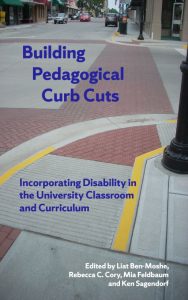
ISBN 978-0-9777847-0-7
5 1/2 x 8 1/2, 223 pages
Building Pedagogical Curb Cuts: Incorporating Disability in the University Classroom and Curriculum
Edited by Liat Ben-Moshe, Rebecca C. Cory, Mia Feldbaum, and Ken Sagendorf
Building Pedagogical Curb Cuts explores ideas about how institutions can better focus on the needs and perspectives of scholars and students with disabilities. The authors, representing a variety of disciplines, provides their personal experiences and methods for creating accessible and challenging learning environments. The book includes a resource guide for making classrooms inclusive and integrating disability perspectives into the curricula.
Look Inside | Order Building Pedagogical Curb Cuts
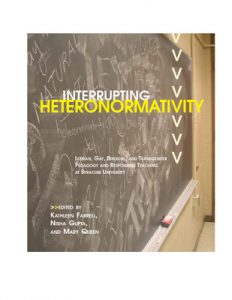
ISBN 978-0-9777847-1-4
7 x 8, 204 pages, notes, bibliography, glossary
Interrupting Heteronormativity: Lesbian, Gay, Bisexual, and Transgender Pedagogy and Responsible Teaching at Syracuse University
Edited by Kathleen Farrell, Nisha Gupta, and Mary Queen
Interrupting Heteronormativity makes visible the everyday, seemingly inconsequential ways in which classrooms become sites for the reinforcement of heteronormative ideologies and practices that inhibit student learning and student-teacher interactions. The volume seeks to aid educators in identifying these subtle biases and working with students to avoid marginalization in the classroom.
Look Inside │ Download full text│ Download individual sections

ISBN 978-0-9777847-2-1
7 x 8 ½, 109 pages
Using Writing To Teach
By Payal Banerjee, Kara Bopp, John Draeger, Hilton Hallock, Tobi Jacobi, Cheryl Najarian, Monique Schmidt, and David Steitz
The conversations and resources gathered here are intended to function as a practical and pedagogical tool for using writing in the university classroom. Readers can use it as a linear text or as a sourcebook for specific questions, concerns, and teaching needs.
Look inside | Download full text | Download individual sections
